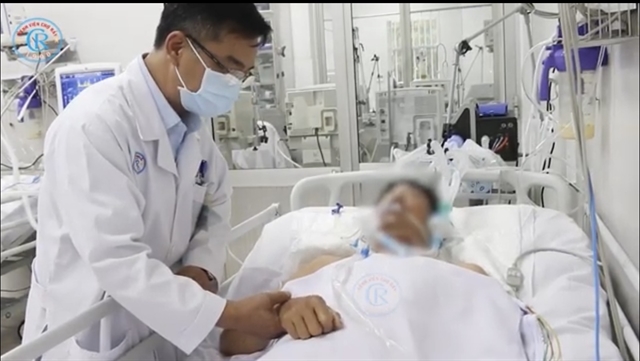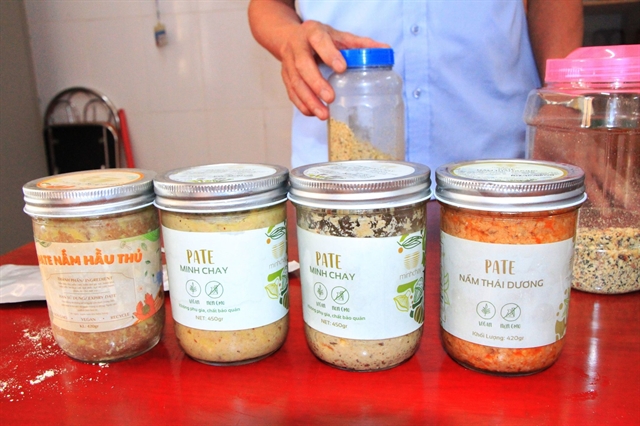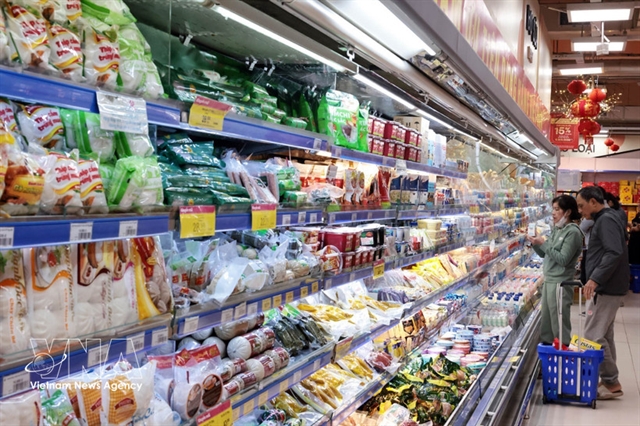 Society
Society

At least 15 people across Việt Nam have been hospitalised because of botulinum toxins since mid-July after eating Minh Chay vegan pate – a product made by the Hà Nội-based Lối Sống Mới Two members Ltd Company.

|
| Five people poisoned with bacterium Clostridium botulinum are treated at HCM City's Chợ Rẫy Hospital. — Photo suckhoedoisong.vn |
HÀ NỘI — At least 15 people across Việt Nam have been hospitalised because of botulinum toxins since mid-July after eating Minh Chay vegan pate – a product made by the Hà Nội-based Lối Sống Mới Two members Ltd Company.
Most of the patients have been treated with ventilation, plasma exchange, antibiotics and physical therapy.
Clostridium botulinum is a bacterium that produces dangerous toxins under low-oxygen conditions. Botulinum toxins are ingested through food in which the bacteria or the spores survive, then grow and produce the toxins, according to doctors at Chợ Rẫy Hospital.
People poisoned with the botulinum toxins usually experience stomachache, fatigue, muscle pain, blurred vision, a dry mouth, difficulty in swallowing and speaking and droopy eyelids. Patients can face respiratory failure caused by paralysed respiratory muscles.
The symptoms usually appear within 12 to 36 hours.
More than 7,000 pate jars from the company, each containing 450 grams, entered the market between July 1 and August 22. Authorities have identified 1,290 customers in HCM City and at least 1,200 in Hà Nội, but have only recalled 10 per cent of the jars.
On August 29, Health Ministry issued warnings over the extremely strong toxins found in Minh Chay pate that left serious impacts on human’s health and could cause fatalities. The ministry called on people to stop consuming the pate and other products of the company.

|
| Products of Lối Sống Mới Two members Ltd Company are found and withdrawn in the central province of Hà Tĩnh. VNA/VNS Photo Phan Quân |
Dr Lê Quốc Hùng, head of the Tropical Diseases Department under Chợ Rẫy Hospital, said that with his 30 years of experience working in the communicable diseases sector, this was the first time he saw cases of clostridium botulinum poisoning in Việt Nam, which explained why health workers mistook the poisoning with other illnesses.
The toxin produced by the bacterium clostridium botulinum is colourless, odourless and tasteless, which made people struggle to find it.
Clostridium botulinum is an anaerobic bacteria and can form spores. Spores produced by the bacteria are heat-resistant and exist widely in the environment, and in the absence of oxygen they germinate, grow and then excrete toxins, Hùng said.
“It’s not easy to kill the bacterium but its toxins can be broken easily with the temperature of over 80 degrees Celsius,” he said.
“To prevent the disease caused by the bacterium and its toxins, the very first things to practise are to have cooked food, boiled water and keep a hygienic environment,” he said.
Hùng added that in the industrial canned food production process, the last stage is sterilisation, so if the food was infected with any harmful bacterium during the canning process, the sterilisation process would remove the bacterium and ensure the products meet food safety requirements.
“Meanwhile, if food is packed manually without being sterilised properly, bacteria, particularly anaerobic bacteria could enjoy favourable conditions to develop and poison eaters,” he said.
“For manually-packed food, it is necessary for us to cook it properly before eating it,” Hùng emphasised.
The doctor also warned that people who experienced relevant symptoms should visit health professionals as infection with clostridium botulinum did not cause fever to the bacteria carriers, different from other bacterial infections.
Antitoxin serum
Dr Nguyễn Trung Nguyên, Director of Poisons Prevention and Control Centre in Bạch Mai Hospital, said that botulinum poisoning was very rare, thus few pharmacy companies wanted to produce and supply antitoxin serum.
Some countries had the antitoxin serum available in their national reserves together with other rare medicines, Nguyên said, adding that the hospital ordered two bottles of antitoxin serum from Thailand to use for two patients treated at the hospital. Each serum bottle costs US$8,000.
Thailand only stored 10 bottles in its national reserve.
“It’s time for Việt Nam to consider setting up a similar reserve to save people during emergencies,” Nguyên said.
He said that the World Health Organization (WHO) agreed to pay for the two bottles of antitoxin serum.
Early this week, Dr Lê Quốc Hùng from HCM City’s Chợ Rẫy Hospital said the hospital worked with the Ministry of Health, WHO and non-governmental organisations to supply the antitoxin, zing.vn reported.
Hùng said it was expected that patients suffering botulinum poisoning would soon access the antitoxin.
The antitoxin works best if taken in the first week after being poisoned.
However, if the patients could get the medicine, their time on ventilators would be shortened, he said. —VNS




